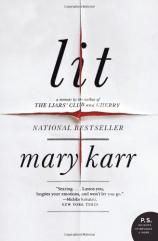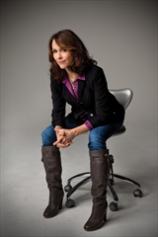Reading Group Guide
Discussion Questions
Lit

1. The first sentence of Lit is “Any way I tell this story is a lie.” What does Mary mean by this? Is she a reliable storyteller? Is there a story in your family famous for its different versions? Is there a story you can’t tell without “feeling” like it’s partially untrue?
2. Mary refers to her mother as “a shadow stitched” to her feet, and to herself and her mother as “dovetailing drunks” and as facing off “like a pair of mirrors”. What does this say about Mary’s relationship with her mother? Do all women feel this way about their moms? At what age is it most painful? At what age --- if any --- does it end?
3. Mary writes, “I sense the oppressive weight of my old self inside me pressing to run wild again. My old mother I’m trying to keep in.” Have you ever found yourself wincing at how you resemble your mother?
4. How is Mary’s trip to college with Mother the “hairpin”, as she describes it, in her early life? This trip marks her introduction to real drinking, but it’s also the point at which Mary would “start furnishing [Mother] with reading instead of the other way around.” What does Mary mean by this, and what’s the significance of this transition? Was there an “official” transition to adulthood in your life? Was it marked by college, marriage, parenthood, career success, or something else?
5. “Words shape our realities,” Mary concludes when she registers the meaning of the Ernst Cassirer quote: “The same function which the image of God performs, the same tendency to permanent existence, may be ascribed to the uttered sound of language”. How does this realization frame Mary’s determination to become a poet? At what times do religion and poetry seem to do the same things for her?
6. Mary calls poetry “one of the sole spiritual acts in our mostly godless household” and poets “the gods I worshipped all my life” Has literature ever substituted for spirituality with you? In what ways has it done so?
7. Mary describes Daddy as a silent fixture of her adolescence. How does her father’s silence emerge, later, as a threatening force? How does her father’s silence compare to the silence of the Whitbread’s, and to Warren’s characteristic reserve? If Mary understood early on that “words would define me, govern and determine me”, then in what way is “wordlessness” her enemy?
8. Why does Mary call her time in recovery a “nervous breakthrough”? Have the darker times in your own life preceded or manifested similar changes or moments of clarity?
9. Mary has “mysterious blanks” in her memory of fights with Warren. What are the glaring blanks in your own memory? Do you think these are genuine blanks of memories or memories that you have chosen to block out?
10. In what ways does Mary’s son Dev save her? If she had lost custody of him in a divorce, would she still have gotten sober? How have your children made you better, at time, or ground you to a nub in others?
Lit
- Publication Date: June 29, 2010
- Paperback: 432 pages
- Publisher: Harper Perennial
- ISBN-10: 0060596996
- ISBN-13: 9780060596996








